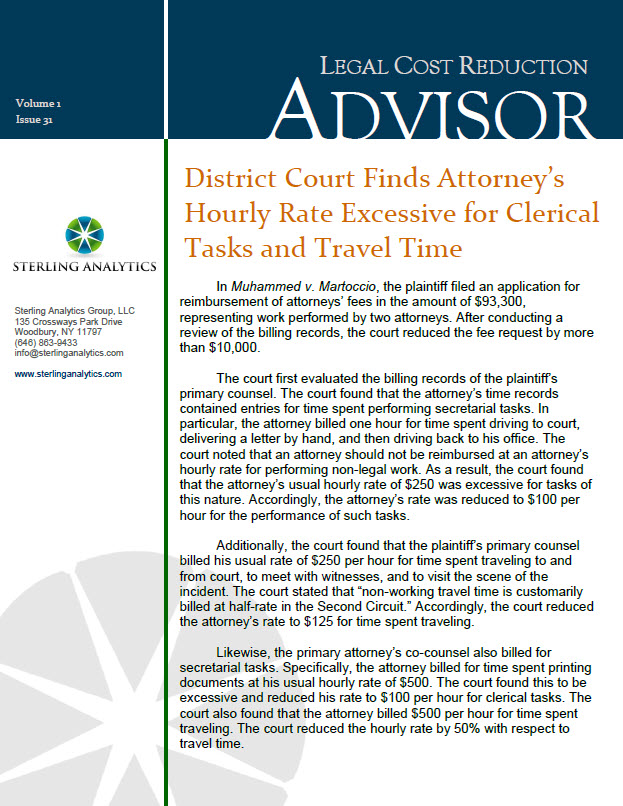In Muhammed v. Martoccio, the plaintiff filed an application for reimbursement of attorneys’ fees in the amount of $93,300, representing work performed by two attorneys. After conducting a review of the billing records, the court reduced the fee request by more than $10,000.
The court first evaluated the billing records of the plaintiff’s primary counsel. The court found that the attorney’s time records contained entries for time spent performing secretarial tasks. In particular, the attorney billed one hour for time spent driving to court, delivering a letter by hand, and then driving back to his office. The court noted that an attorney should not be reimbursed at an attorney’s hourly rate for performing non-legal work. As a result, the court found that the attorney’s usual hourly rate of $250 was excessive for tasks of this nature. Accordingly, the attorney’s rate was reduced to $100 per hour for the performance of such tasks
Additionally, the court found that the plaintiff’s primary counsel billed his usual rate of $250 per hour for time spent traveling to and from court, to meet with witnesses, and to visit the scene of the incident. The court stated that “non-working travel time is customarily billed at half-rate in the Second Circuit.” Accordingly, the court reduced the attorney’s rate to $125 for time spent traveling.
Likewise, the primary attorney’s co-counsel also billed for secretarial tasks. Specifically, the attorney billed for time spent printing documents at his usual hourly rate of $500. The court found this to be excessive and reduced his rate to $100 per hour for clerical tasks. The court also found that the attorney billed $500 per hour for time spent traveling. The court reduced the hourly rate by 50% with respect to travel time.
Implications for Legal Billing: As demonstrated by this decision, an attorney cannot bill his or her usual hourly rate for time spent performing non-legal or secretarial work. In solving this issue, the court in this case reduced the hourly rate to $100 for clerical tasks performed by the attorneys. However, it is important to note that some courts will completely eliminate clerical tasks from a fee request. This is because clerical tasks are considered part of an attorney’s overhead and are reflected in the hourly rates charged by attorneys. Additionally, travel time should not be charged at an attorney’s hourly rate. The general rule is that the attorney’s hourly rate should be reduced by 50% for time spent traveling. Non-working travel time does not constitute legal work and, therefore, an attorney’s hourly rate of hundreds of dollars an hour is not justifiable.
*Muhammed v. Martoccio, 2010 WL 3718560 (D. Conn. 2010). Full copies of court decisions may be available through counsel or through various Internet links or paid services.
By Laura R. Bugdin


